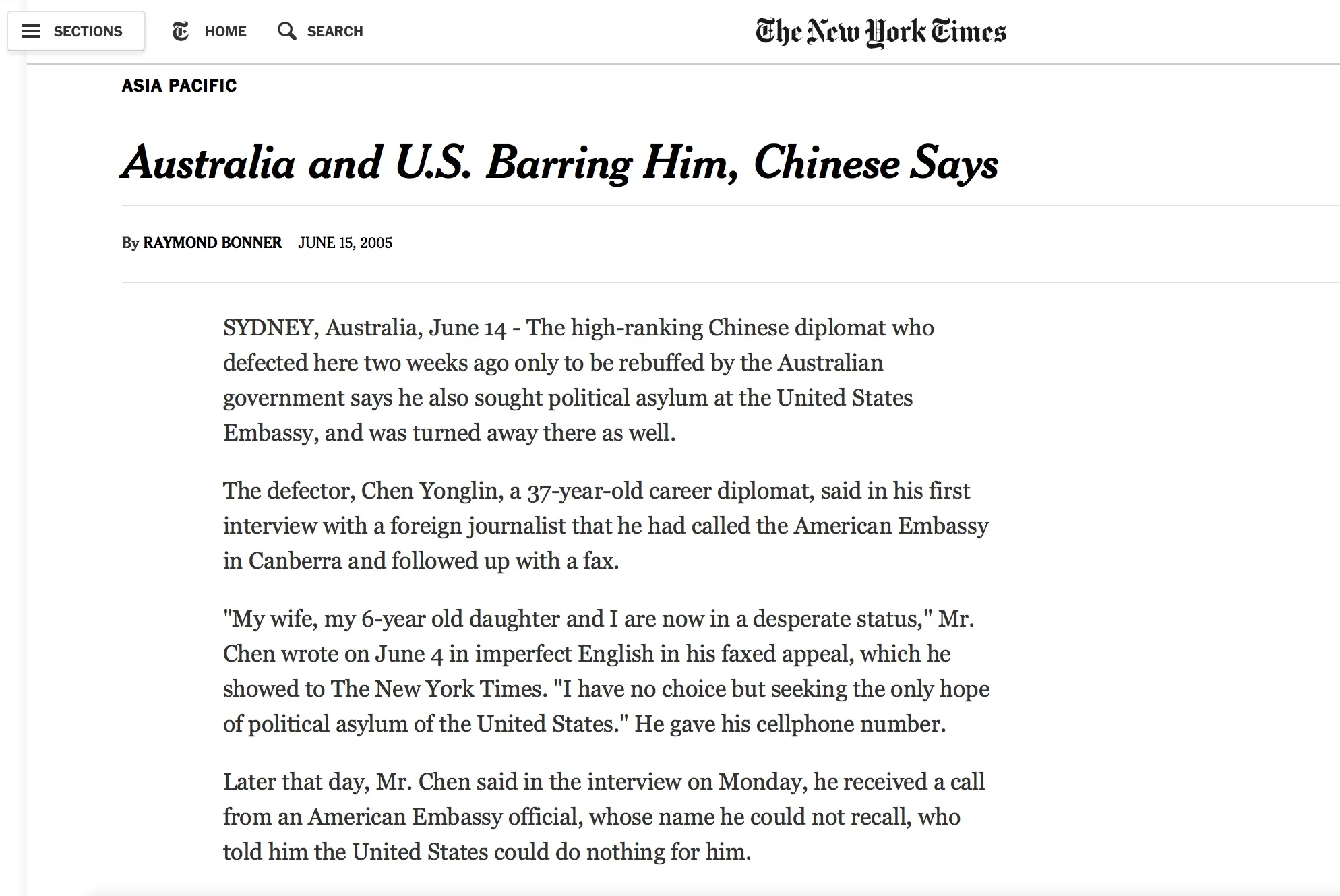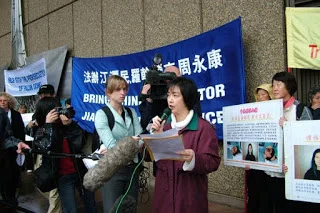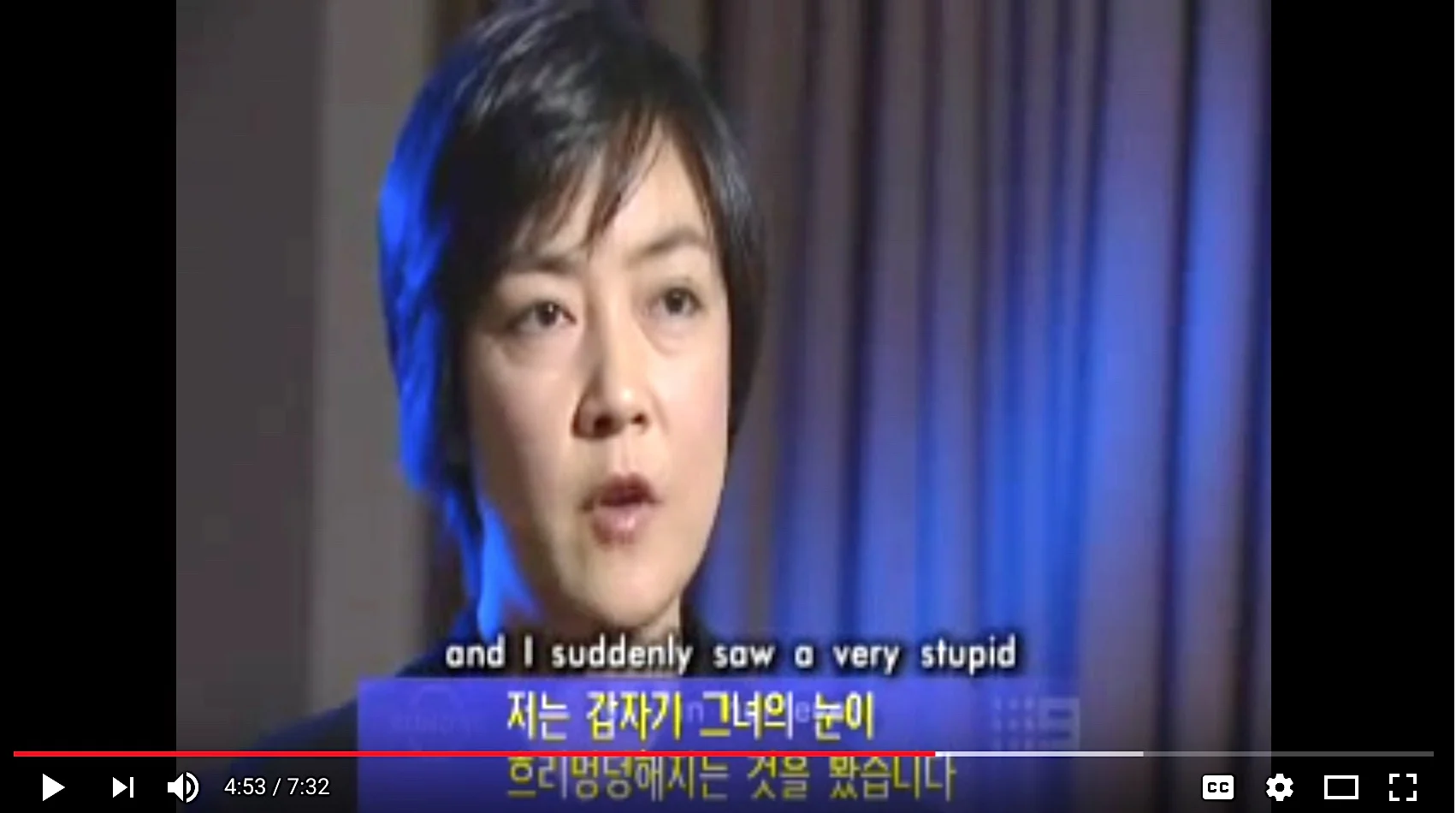Australia and U.S. Barring Him, Chinese Says
By RAYMOND BONNER JUNE 15, 2005
SYDNEY, Australia, June 14 - The high-ranking Chinese diplomat who defected here two weeks ago only to be rebuffed by the Australian government says he also sought political asylum at the United States Embassy, and was turned away there as well.
The defector, Chen Yonglin, a 37-year-old career diplomat, said in his first interview with a foreign journalist that he had called the American Embassy in Canberra and followed up with a fax.
"My wife, my 6-year old daughter and I are now in a desperate status," Mr. Chen wrote on June 4 in imperfect English in his faxed appeal, which he showed to The New York Times. "I have no choice but seeking the only hope of political asylum of the United States." He gave his cellphone number.
Later that day, Mr. Chen said in the interview on Monday, he received a call from an American Embassy official, whose name he could not recall, who told him the United States could do nothing for him.
Why Mr. Chen was dismissed without even an interview is not clear. Generally, in the past, defectors from Communist countries, whether athletes, dancers or diplomats, have been protected and assisted with their asylum claims.
A spokeswoman for the American Embassy in Canberra would not comment on Mr. Chen's case. Nor would a State Department spokesman in Washington, Noel C. Clay, who said it was a longstanding policy not to comment on individual requests "in order to protect any possible applicants, their families, and the integrity and confidentiality of the process."
Since he walked out of the Chinese Consulate here on May 26, Mr. Chen has created a political storm in Australia, with both conservatives and liberals criticizing the government for turning away a diplomat who has suggested that he has valuable intelligence to offer and who has approached the West as a vocal critic of China's human rights record.
Some politicians and commentators say Australia had put economic interests -- China is a major buyer of its natural resources -- ahead of concerns about human rights. Others have been skeptical of Mr. Chen's claims, saying he is overstating them to avoid being sent home.
But Mr. Chen's credentials have not been challenged, and few doubt that he would be punished if he returned to China. He held the title of a political first secretary and says his principal duties were to spy on Falun Gong and pro-democracy activists.
Since his case has come to light here, Mr. Chen and his wife, Jin Ping, and their daughter, Fang Rong, have lived in virtual hiding and are now applying to remain in Australia under a "protective visa."
Ms. Jin, also present during the interview, said she had supported her husband's decision to defect, which the couple described as a result of years of growing disillusionment with the Chinese authorities.
Each had been a student activist in the late 1980's, he at a university in Beijing, she while studying law in Shanghai. They were not married at the time. After the Tiananmen Square demonstrations were put down in 1989, they were sent separately for "re-education," they said.
Ms. Jin said she was assigned to work in a family planning program in a rural area. One woman she tended to was eight months pregnant with her second child when forced into a hospital for an abortion, she said. The woman escaped, was caught, and an operation performed. The baby boy, born alive, was then killed by the doctors, she said.
The couple were accompanied during the interview by Jennifer Zeng, who acted as an interpreter when the couple needed help with their English. Ms. Zeng is a Falun Gong practitioner and the author of "Witnessing History: One Woman's Fight for Freedom and Falun Gong."
Mr. Chen said he was not a member of Falun Gong, but he is clearly sympathetic to the group. In his letter to Australian authorities seeking asylum, Mr. Chen wrote, "Falun Gong may be a cult, but its practitioners are a social vulnerable group and innocent people."
Mr. Chen said his father was accused of antirevolutionary activity during the Cultural Revolution, taken away and beaten for two weeks before he died. As a boy, Mr. Chen said he raised the family's pigs, goats and chickens to help his mother, a primary school teacher, provide for the family.
He decided to join the Foreign Service, he said, for the simple reason that it would be steady employment. He started with a menial job in the Foreign Ministry. When there was an opening for a post in Fiji, he took it. "I was quite eager to leave that environment inside China," he said. "There was no freedom."
By the time he was posted to Sydney in 2001, he said he had lost hope that China's government might change. His job here was to monitor the activities of dissidents, and almost from the beginning, it weighed on his conscience. "It's dirty work," he said. He was scheduled to leave in August.
Originally published at:
http://www.nytimes.com/2005/06/15/world/asia/australia-and-us-barring-him-chinese-says.html?mcubz=1




